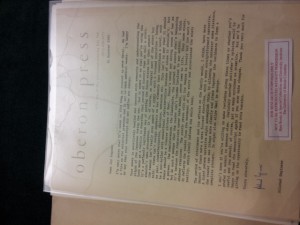In our last ASTU class we were discussing this topic – the creation of fonds and the writing process in relation to our global citizens program. The question was asked: how has your understanding of the writing process changed throughout the semester? By visiting the RBSC library I definitely gained a greater understanding of an author’s writing process. The outlines, drafts, research is not all that unlike my own, just with a longer writing process spread out over time. I think what we talked about in class connects really well to the ideas that you bring up in your blog, Kihan. It does seem to me, that although Joy Kogawa’s work is fictional, we can see aspects of her life scattered throughout the pages. After reading your blog, I reflected on something I saw at the RBSC library that made me think more in depth about this idea. One of the fonds that I was looking at showed a rejection letter by Oberon press. The letter was writing to Joy Kogawa, informing her, that they thought she was using her book more “As a vehicle to describe that period of history than to tell a story”, “the reader isn’t really ever aware of a story” and that “there is not enough emphasis on key elements that constitute a novel”. While this may be true in a way, (she does include several historical texts showing the role of the Canadian government in the Japanese peoples oppression) her novel, as you mention in your blog is reminiscent of her own life. As such I would disagree with the people at Oberon press. Since the book is about opening up the conversation on Japanese oppression in Canada, it must have a historical element to be able to create conversation. That being said, her novel also connects to her own life in many ways (like the example you give) through this historical content. The addition of Joy Kogawa’s imagination in creating a work of fiction (as we see in the fonds) shows that her book is more than historical. It embodies her own experience as well, forming a narrative of memory that is fictional, but that deals with important historical issues. To answer to your question, Kihan, as to whether her authority would change if she had not been a victim herself, I would say yes. Not only that, but her whole writing process would have changed, and the fonds she would have collected would have been totally different, resulting In a book (as you put it) that would offer a different glimpse into a different mind.
Here is the letter that I mentioned: 
